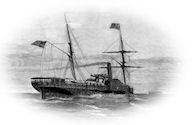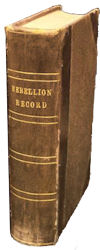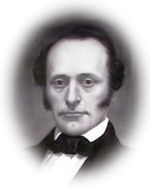.
.
FORT COLUMBUS, N. Y. H.,
January 13, 1861.
COLONEL: Pursuant to instructions, dated Headquarters of the Army, January 5, 1861, I embarked on the evening of Saturday, 5th instant, from Governor’s Island, at 6 o’clock p.m., on a steam-tug, which transferred us to the steamer Star of the West.
My command consisted of two hundred men, recruits from the depot, fifty of whom were of the permanent party. My officers were First Lieut. W. A. Webb, Fifth Infantry; Second Lieut. C. W. Thomas, First Infantry, and Assist. Surg. P. G. S. Ten Broeck, Medical Department.
On Tuesday afternoon, 8th instant, arms and ammunition were issued to all the men. About midnight same evening we arrived off Charleston Harbor, and remained groping in the dark until nearly day, when we discovered the light on Fort Sumter, which told us where we were. The other coast light marking the approaches to the harbor had been extinguished, and the outer buoy marking the channel across the bar gone.
During the night we saw what we supposed to be the light of a steamer cruising off the harbor, but she did not discover us, as our lights were all out. Just before day we discovered a steamer lying off the main ship channel. As soon as they made us out they burned one blue light and two red lights, and, receiving no response from us, immediately steamed up the channel. As soon as we had light enough we crossed the bar, and steamed up the main ship channel. This was on the first of the ebb tide, the steamer ahead of us firing rockets and burning lights as she went up. We proceeded without interruption until we arrived within one and three-quarter miles of Forts Sumter and Moultrie–they being apparently equidistant–when we were opened on by a masked battery near the north end of Morris Island. This battery was about five-eighths of a mile distant from us, and we were keeping as near into it as we could, to avoid the fire of Fort Moultrie. Before we were fired upon we had discovered a red palmetto flag flying, but could see nothing to indicate that there was a battery there.
We went into the harbor with the American ensign hoisted on the flagstaff, and as soon as the first shot was fired a full-sized garrison flag was displayed at our fore, but the one was no more respected than the other. We kept on, still under the fire of the battery, most of the balls passing over us, one just missing the machinery, another striking but a few feet from the rudder, while a ricochet shot struck us in the fore-chains, about two feet above the water line, and just below where the man was throwing the lead. The American flag was flying at Fort Sumter, but we saw no flag at Fort Moultrie, and there were no guns fired from either of these fortifications.
Finding it impossible to take my command to Fort Sumter, I was obliged most reluctantly to turn about, and try to make my way out of the harbor before my retreat should be cut off by vessels then in sight, supposed to be the cutter Aiken, coming down the channel in tow of a steamer, with the evident purpose of cutting us off. A brisk fire was kept up on us by the battery as long as we remained within range, but, fortunately, without damage to us, and we succeeded in recrossing the bar in safety, the steamer touching two or three times. Our course was now laid for New York Harbor, and we were followed for some hours by a steamer from Charleston for the purpose of watching us.
During the whole trip downward the troops were kept out of sight whenever a vessel came near enough to us to distinguish them, and the morning we entered the harbor of Charleston they were sent down before daylight, and kept there until after we got out of the harbor again. From the preparations that had been made for us I have every reason to believe the Charlestonians were perfectly aware of our coming.
We arrived in New York Harbor on the morning of the 12th instant, and disembarked at 8 o’clock this morning, the 13th, by orders from Headquarters of the Army.
The conduct of the officers and men under my command during the whole trip, and particularly while under fire, was unexceptionable.
Capt. John McGowan, commanding the steamer Star of the West, deserves the highest praise for the energy, perseverance, and ability displayed in trying to carry out his orders to put the troops in Fort Sumter. He was ably assisted by Mr. Walter Brewer, the New York pilot taken from this place.
I am, colonel, very respectfully, your obedient servant,
CHAS. R. WOODS,
First Lieutenant, Ninth Infantry, Commanding.
Col. L. THOMAS,
Assistant Adjutant-General, U.S.A., Washington. D.C.








